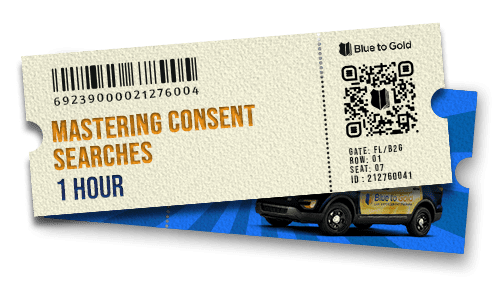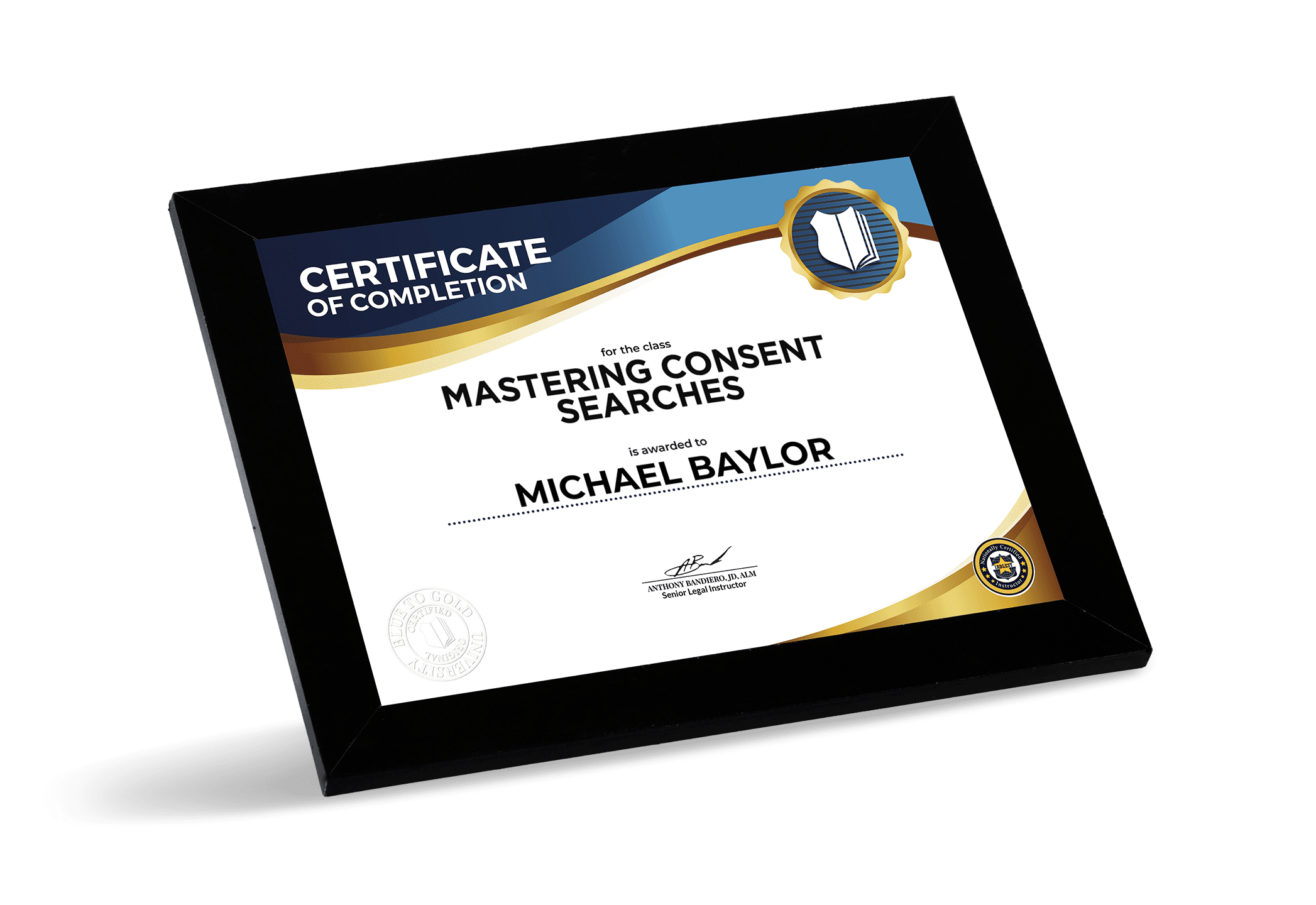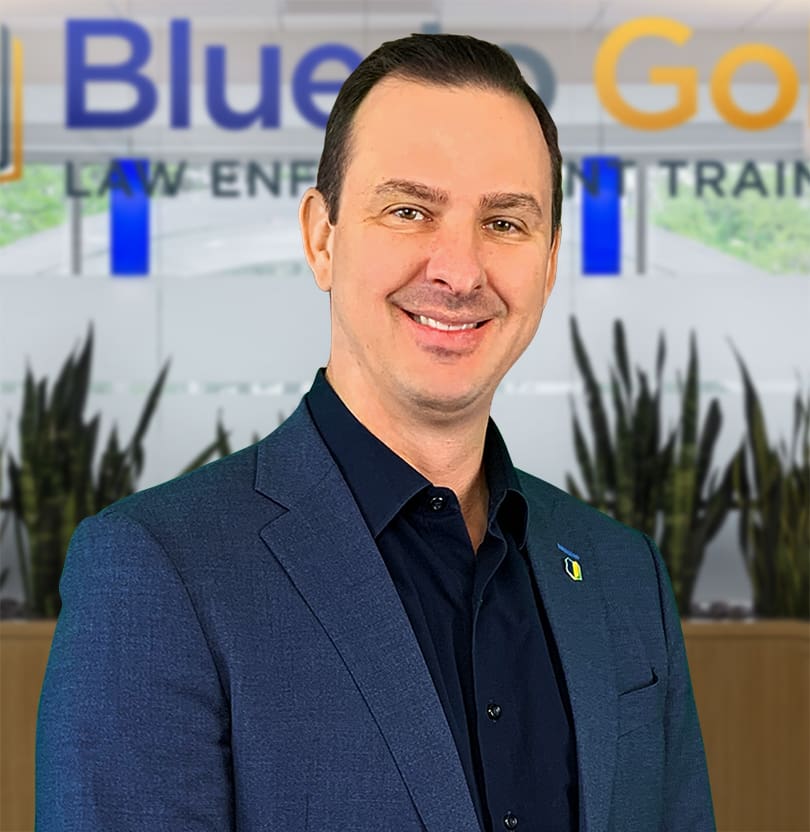Module One: Course Introduction
1. Instructor Introduction
2. Explain the course
3. Encourage attendees to ask questions and share feedback with other attendees.
4. Explain that certificates will be emailed after the
5. Go over the three disclaimers:
- Laws and agency standard operating procedures may be more restrictive. Blue to Gold is teaching the federal standard unless otherwise stated. Therefore, students must know their state and local requirements in addition to the federal standard.
- If students have any doubts about their actions, ask a supervisor or legal advisor.
- The course is not legal advice, but legal education. Therefore, nothing we teach should be interpreted as legal advice. Check with your agency’s legal advisor for legal advice.
Module Two: Consent to Search
1. Why do suspects consent to search?
2. Content: The standard of proof for a consensual encounter is different then a consensual search. However, if the encounter itself was unlawful then even any resulting search will be held unlawful, even if voluntarily given.
- Not required to tell person they can refuse, but if they were told, consent will likely be found consensual;
- Search practices must be reasonable
- Search must not exceed scope of consent
- Subject must be able to stop search at any time
- Consent can be given during temporary detention or even arrest, but voluntariness will be more scrutinized
- Must not further detain subject in order to seek consent, they must reasonably feel free to go before granting consensual encounter consent
- Any claim of authority that the search can be conducted, even without consent, will usually find the search coerced.
Key points: Articulate these three points in your reports.
3. Step One
4. Legal Rule: Voluntary consent means the person had a choice in the matter.
5. Various state-specific restrictions.
6. Video: “Consent to Search: Voluntary?”
7. Example
8. Question
9. Legal Rule: There are legal advantages to ending traffic stop, converting into consensual encounter, then seeking consent to
10. Things that help consent
11. Video: “Telling Suspect” Not Under Arrest”
12. Things that help Consent
13. Pro Tip: If the suspect is detained in a police car, establish a line of communication to any officer
14. If the suspect is in the back of the car while the search is ongoing or if he doesn’t have the ability to modify or terminate the consent, he may argue that he was about to modify the search but couldn’t.
15. A suspect who helps with the search is almost never found to be involuntary, even in a coercive environment:
- Don’t read Miranda!
- Tell suspect he’s not under arrest
- Advise he can deny consent
- Treat him as witness, not suspect
- Be friendly, not overbearing
- Allow him to watch search
- Advice he can modify or cancel search at any time
16. Things that help consent
17. Things that help consent
18. Legal Rule: What you ask to search for defines the scope of search
19. The standard of proof for a consensual encounter is different then a consensual search. However, if the encounter itself was unlawful then even any resulting search will be held unlawful, even if voluntarily given.
- Not required to tell person they can refuse, but if they were told, consent will likely be found consensual
- Search practices must be reasonable
- Search must not exceed scope of consent
- Subject must be able to stop search at any time
- Consent can be given during temporary detention or even arrest, but voluntariness will be more scrutinized
- Must not further detain subject in order to seek consent, they must reasonably feel free to go before granting consensual encounter consent
- Any claim of authority that the search can be conducted, even without consent, will usually find the search
Key points: Articulate these three points in your reports.
20. The standard for measuring the scope of a suspect’s consent to a warrantless search under the Fourth Amendment is that of a typical reasonable person, not a typical reasonable police officer; therefore, the focus is solely on what a typical reasonable person would understand the scope of the consent to be, based on the words spoken and the context in which they are spoken, not on what a police officer may understand as the places in a vehicle where narcotics or firearms may be hidden.
21. Video: “Consent to Search: Scope Issue”
22. Words Matter!
23. Video: “Consent to Search: You Decide”
24. Questions
25. Things that help consent
26. Legal Rule: A destructive search requires express consent or automobile exception.
27. United States v. Osage, 235 F.3d 518 (10th Cir.2000) (consent to search bag did not permit opening of sealed cans labeled “tamales in gravy”; disagreeing with Kim, infra, court holds “that the opening of a sealed can, thereby rendering it useless and incapable of performing its designated function, is more like breaking open a locked briefcase than opening the folds of a paper bag”)
28. State v. Howell, 284 Neb. 559, 822 N.W.2d 391 (2012) (opening “gift-wrapped box” within scope of consent to search vehicle, as any damage to box and wrapping paper “could be fixed with a piece of tape”)
29. Things that Hurt consent
30. Legal Rule: You may tell someone a justified legal truth, and provide options, but never make coercive threats.
31. PRACTICAL SUGGESTION: If the officer fairly presents the defendant with a choice whether to consent, the mere fact that defendant, for reasons that are particular to him or her, subjectively may feel that he or she has no realistic choice under the circumstances does not render the consent invalid as “mere acquiescence.” Accordingly, when requesting consent, the officer should ask in a question format (rather than direct or command) and avoid using words or phrases that fairly could be understood by the suspect as requiring compliance. Although an officer is not obliged to inform the person explicitly that he or she has a right to refuse, the officer should avoid acts or words that fairly could convey to the suspect that a search will occur regardless of whether he or she consents.
32. Case Sample: Officer had R.S. for narcotics and asked for consent to search which driver denied. Officer then told her that he would call a K9 and driver changed mind and gave consent. Coerced? State v. Baum
- Held: No. Truthfully telling person a K9 may be called is not per se coercive.
33. Things that Hurt Consent
34. Things that Hurt Consent
Module Three: Third Party Consent
1. Legal Rule: A person with common authority over an area or item can allow you to perform the same search they could.
2. Pro Tip: Common authority means you reasonably believe they have either: Joint ownership; Joint access; or Control.
3. OR: The person must have actual authority – so you cannot be wrong
4. Pro Tip: There is an easy test to apply in the field!
5. Piggyback Rule
6.
7.
8. Silence and Consent Searches
9.
10.
11.
12.
13.
Module Four: Takeaways












